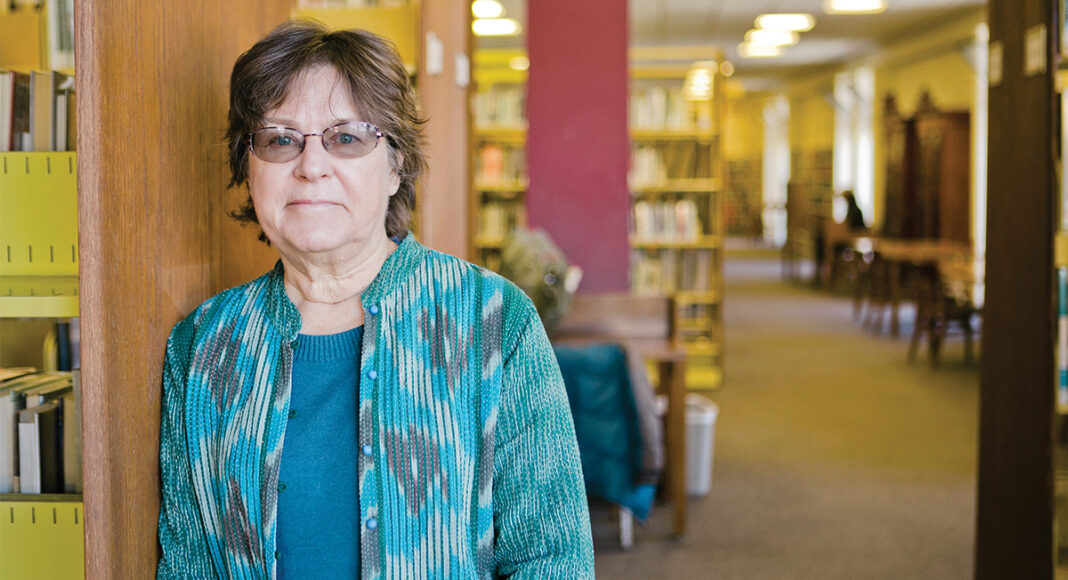[dropcap]I[/dropcap]f she didn’t write books, Karen Joy Fowler might spend most of her time reading.
“I have to read while I’m writing a book,” says the author of the celebrated Jane Austen Book Club. “I am in this space of needing to do other things. My brain keeps searching. It may have nothing to do with what I’m writing, but the cross pollination of ideas is important. One book can influence the next. And reading keeps my enthusiasm for books front and center.”
Fowler made her home in Davis for many decades until her husband’s retirement. “He wanted to go back to southern California and I had visions of retiring to Whidbey Island in the Pacific Northwest,” she says. “So we settled on Santa Cruz.” Where she’s lived for 10 years.
About the nuts and bolts of her writing practice: “I don’t write every day,” she admits, with something close to a laugh. “Too many distractions. Except at writers retreats. That sort of hothouse environment allows me to not think about dinner or shopping, and just write.” Her favorite retreat is Hedgebrook on Whidbey Island. “Listening to others reading strengthens me as a critical reader. Often it’s a wake-up call for me. I can learn what I think through a piece that is not my own.”
Fowler’s eyes are the color of storm clouds over the ocean, an intense blue-grey. She chooses her words carefully and without unnecessary drama. She is devoted to Pilates.
“I never took a writing class, I have no literary background. My degree was in political science. And perhaps that is why I bring a wide lens to my stories. I’m always aware that there’s a big world out there.”
She admits to a “mystifying confidence,” about her writing, characterizing herself as persistent, “even when things aren’t working. I am very stubborn.” Fowler claims that writing the first draft of a book helps her clarify the project itself. “Quite recently I had some insight into what is now a four-year novel I’m working on. I was at a family dinner, trying to answer someone’s question about what kind of book I was writing. I realized I wasn’t clear about what kind of book it was.” Process provides insight, something many writers agree upon. In the writing, the book’s focus emerges.
“I would prefer to work faster, but I can’t,” she says. An impish smile crosses her face. “But I don’t believe that distractions are necessarily bad. It can appear that I’m wasting time, but the ideas are percolating in the background.” From anyone else, that might sound like a dodge.
Fowler spent her first 11 years in Bloomington, Indiana. “I read a lot,” she says. “Books in the library there weren’t cataloged according to genre. The titles were simply all arranged alphabetically. So I never thought in terms of genres, didn’t care about genre distinctions. That freed me.” And that freedom resulted in Fowler’s eclectic portfolio of short stories, novels, science fiction, and fantasy. “When I went to my first science fiction writers conference I found a community that had a much clearer continual conversation. They were my people.” Now she grins and her eyes morph to pale blue. Her tone becomes hushed, even reverent when she mentions Ursula Le Guin and Donna Haraway, whose literary territory interweaves with her own. Intrigued by entwinings of gender as well as genre, Fowler founded the James Tiptree Award which focuses on expanding explorations of gender. “Sarah Canary,” her first book, “pushed back against the idea that communication could even be possible. The central character is inexplicable,” Fowler explains. “She cannot communicate. So those who meet her impose their view of who she is according to who they are.” Fowler clearly relishes breaking through expectations. “There are no rules when writing a novel. And while genre does have rules, they are rules I can break. Otherwise the books would be formulaic and predictable.”
A passionate reader, Fowler often re-reads books she has loved. Jane Austen, for example. “She’s a puzzle to me, a puzzle I like thinking about. I don’t think there’s a more elastic writer. She is a romance writer and she’s a feminist. She’s a Rorschach. As a young girl I thought her books were romantic comedy.” She pauses. “When I re-read a book I bring with me the ghosts of all my previous selves. They change the book with each reading, or rather it is never the same book that I’m reading.”
Fowler confesses that she burned out on Jane Austen when writing her bestseller on the 18th-century novelist. “There’s no shortage of books about her,” she says, eyes twinkling. Currently working on a book set in 19th Century California, Fowler happily admits that right now she has “no deadline, no rush.”













